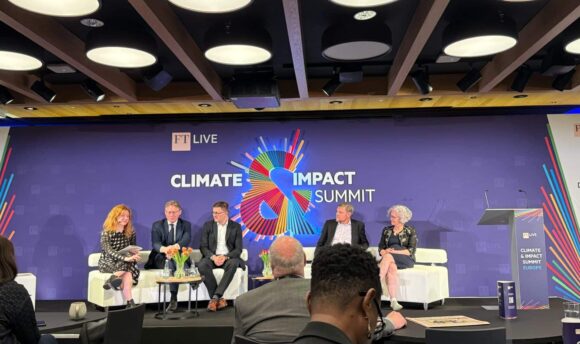Ever more serious hurricanes, wildfires and floods have triggered record losses for the insurance industry, and regions which are particularly threatened by extreme weather events are at risk of becoming uninsurable. Given these trends you would think that U.S. insurers would have turned out in large numbers to attend the first ever conference on insurance and climate risk in New York earlier this week. Alas, while scores of European and Canadian insurers, brokers, consultants, academics and activists attended the timely event, only very few U.S. insurance companies showed up.
Insurers can precisely model how climate change affects physical risks such as floods and hurricanes and are responding by increasing their premiums or even withdrawing from certain regions. Yet California’s insurance commissioner Dave Jones warned at the start of the conference that insurance companies are ill prepared to deal with the massive changes which global warming will trigger throughout the economy, for example by driving coal and other fossil fuel companies into bankruptcy.
The lack of interest in this week’s conference confirms that U.S. insurers have so far not woken up to the risks of climate change. According to a recent report by the Asset Owners Disclosure Project, 22 out of 25 large U.S. insurers are laggards or bystanders when it comes to taking precautions against climate risks. Meanwhile the consultancy Vigeo Eiris found that only 7% of U.S. insurers were taking meaningful actions to promote the much-needed clean energy transition – a lower share not just compared with their European peers (52%), but also with U.S. companies across all sectors (22%).
So far, no major U.S. insurer has responded to the call of the new Insure Our Future campaign to stop insuring and divest from coal and tar sands. Only Lemonade, a small if rapidly growing home insurer, has pledged to keep its portfolio completely free of fossil fuels. At the climate insurance conference in New York I argued that Lemonade and other early movers on fossil fuels will enjoy three benefits:
- Financial benefits: In the past eight years, fossil fuel-free investment portfolios have consistently out-performed standard portfolios which included oil, gas and coal shares. Insurance companies which divested from fossil fuels did well by doing good!
- Commercial benefits: A senior manager of British insurer Aviva warned in New York that his company will no longer be able to insure property and casualty risks if average global temperatures increase by 4 degrees. By ending their support for fossil fuels, insurers can contribute to a planet which remains insurable.
- Reputational benefits: Growing majorities of the U.S. population are concerned about climate change and support taking climate action. Concern about climate change reaches almost 90% among millennials for example. These groups are important for insurers not just as customers but also as employees. Representatives of Allianz and Lemonade confirmed at the conference that the steps their companies have taken on climate change and fossil fuels found a very positive response among their employees.
U.S. insurers have so far managed to hide behind other actors and disassociate themselves from the debate about fossil fuels and climate change. Going forward, we will give praise to early movers taking necessary actions but will make sure that companies which still insure and invest in coal and other fossil fuels are firmly tainted by climate change in the public mind.



